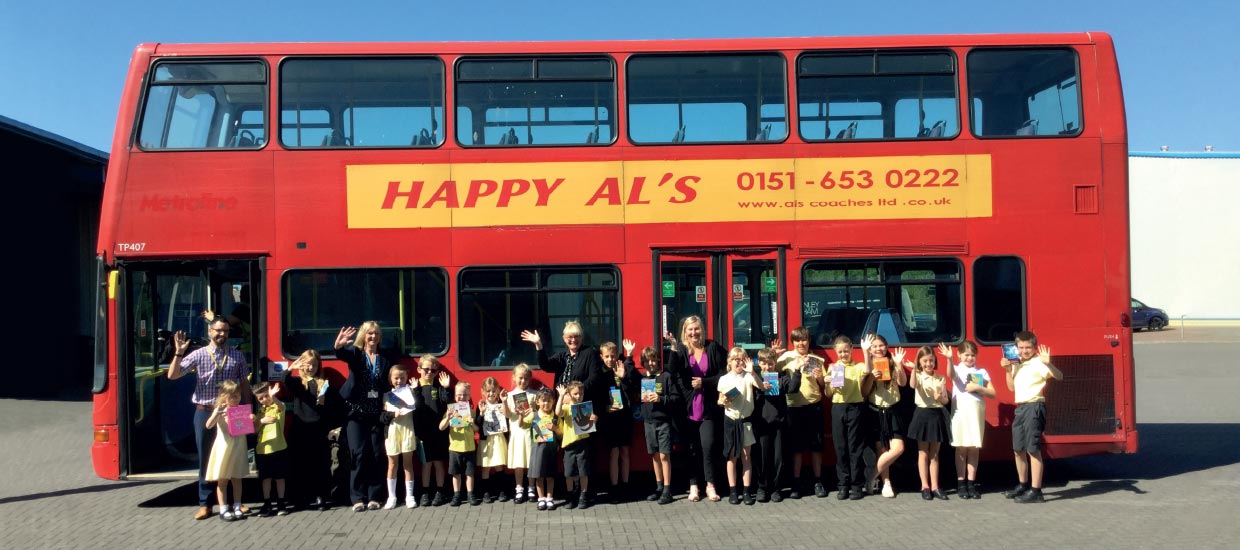We raised over £11,500 for a library bus
Multiple sponsors meant this school could create an inspiring reading space

‘We wanted to improve the reading skills of our pupils so that our data was above the national average. In particular, we wanted to drive up enjoyment of reading among boys, who often tend to struggle to engage with books. The headteacher and I were keen to tackle this issue head on by creating a buzz about reading. The only question was how?
Our old school library was an uninviting box-shaped room, with tall rows of shelving and nothing at all to entice the children to explore its contents. I could relate to the boys’ lack of motivation with reading as all I had wanted to do at their age was play sport.
I’d seen a couple of library buses in action, and I thought perhaps we could take this idea and add even more “wow factor” for the pupils by refurbishing an old double-decker bus. But having run a deficit of just over £30,000 for a number of years, the school had no spare budget capacity. Our governors wouldn’t allow any spend for the reading project to come out of the school budget, so that meant raising the money through sponsorship, grants and anything else we could think of.
I started drumming up business sponsorship by visiting a couple of industrial estates in the village, armed with a clipboard and copies of an “All Aboard the Ann Edwards’ Library Bus” leaflet. I also produced a sponsorship form so that we could secure written commitment of a financial contribution of at least £250 from each company. In return, we offered to publicise their support by putting their logo on our bus. Out of the first 15 companies we visited, 13 signed on the dotted line, agreeing to donate at least £250. We eventually got 30 businesses on board!
I also applied for a Tesco Bags of Help grant and a Ministry of Defence Education Support grant. These were both successful and gave us an additional £3,500 towards our total. I posted lots of status updates about the project on LinkedIn, using the hashtag #AnnEdwardsLibraryBus. This very quickly generated lots of interest and sponsorship from five national companies: Capita SIMS, InVentry, Deane Computer Solutions, Ryman Education and RS Assessment.
We sent out a letter to parents to keep them informed of what was happening and encourage them to keep the buzz of the project going.
I decided to do my bit by running my first marathon (Manchester Marathon). With sponsorship from parents, school staff, family and friends, I raised £650.
In total, we raised more than £11,500 over 12 months. The project itself took 18 months to complete. The process involved purchasing an old double-decker bus and decommissioning it. We then had to strip out the interior before installing shelving, electrics and air-conditioning.
Fortunately, several local and national companies (Bosch Rexroth, Hercules Construction, Aggregate Industries, Kevin Messenger General Builders and Barnes Coaches) not only donated to the project financially, but they were also able to provide skilled workers to complete the works at no cost.
We wanted to keep the look and feel of a real bus so that a visit to the library would be like the beginning of an adventurous journey. On the top deck of the bus, we installed bookshelves and set up a bean bag seating area where the back row used to be. The lower deck is mainly set aside as reading space, with some of the original seats and a laptop borrowing system set up in the old driver’s seat.
To build further excitement and incentivise our pupils in their learning, we announced that the children who showed the most progress in each year group would be the first on the bus when it arrived. We also ran a competition to name the bus, where pupils could donate £1 to submit an entry. The winning name was pulled out of a hat during a whole school assembly, and the library bus is now called “The Big Read Bus”.
The pupils were amazed and delighted when they first saw their finished library. They have since been very keen to go out of the classroom and read on the bus every day. While we have noticed an improvement in our reading data, especially among boys, the passion for reading across all pupils has been the biggest noticeable difference.
We had approached David Walliams to do an official opening in front of the whole school and all the companies that supported us, but this has had to be put on hold due to the coronavirus pandemic. News of the success of our project has spread though, and we have been contacted by St Werburgh
- Kevin Parker, school business manager, Ann Edwards CofE Primary School, Cirencester, Gloucestershire (262 pupils)
More on grants
